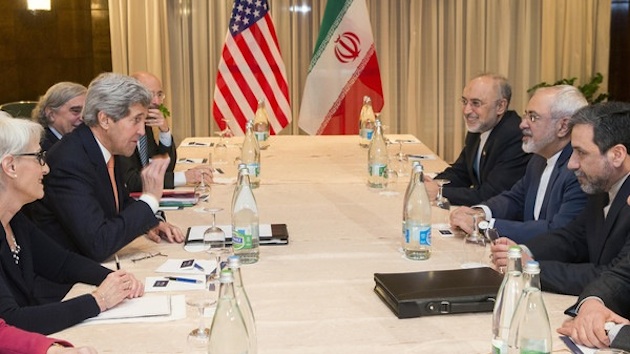

U.S. Secretary of State John Kerry, second from left, meets with Iranian Foreign Minister Mohammad Javad Zarif, second from right, for a new round of nuclear negotiations Wednesday, March 4, 2015, in Montreux, Switzerland. (Photo: AP/Evan Vucci, Pool)
While Israeli Prime Minister Benjamin Netanyahu has garnered the headlines opposing the Iran deal, Arab allies in the Middle East are sounding the alarm following a report leaking the details of the framework negotiations.
The U.S. and Iran are closing in on a nuclear deal that only requires Tehran make a 40 percent cut to the number of machines it could use to make an atomic bomb, officials told The Associated Press on Thursday. In return, the Iranians would get substantial economic relief from some crippling sanctions and a partial lift of a U.N. embargo on conventional arms, all of which brought them to the negotiation table in the first place.
Iran will not have to prove a change in behavior, nor have they been cooperating with oversight efforts by the United Nations Atomic Energy Agency.
Diplomats from both sides are racing to meet a March 31 deadline for a framework agreement and a final must be made by the end of June, but lawmakers and Middle East allies agree these terms will leave the world’s foremost state-sponsor of terrorism a threshold nuclear power.
“This is not the kind of deal we can live with,” an aide to the late Saudi King Abdullah told PPD. “We can’t live with the terms of this deal as report.”
The official, who spoke on the condition of anonymity because he was not authorized to speak to the media, told PPD that the number of centrifuges reported by the Associated Press is indeed what the Saudi government has been told to accept by Washington.
But that’s just not acceptable to the Saudi government, who grow weary of the Obama administration’s motives regarding Iran and its proxy regimes in the Middle East, including in Syria and Yemen.
The AP reported the deal would limit the number of centrifuges Iran can operate to enrich uranium to a significant 6,000 centrifuges, down even further from the 6,500 criticized in recent weeks. The deal also does indeed contain a sunset provision, which will cause the restrictions to expire in only a decade.
Tehran now runs 10,000 machines, but with restrictions on enrichment levels and the types of centrifuges Iran can use, Washington believes it can extend the time Tehran would need to produce a nuclear weapon to at least a year.
As of now, Iran would require only two to three months to amass enough material to make a bomb.
Meanwhile, Sen. Robert Corker, R-Tenn., the chairman of the Senate Foreign Relations Committee said he would move forward with legislation requiring President Obama to get the approval of the Senate before agreeing to any nuclear deal. The legislation, by some estimates, is just one Democratic vote away from achieving a veto-proof majority, while 360 House Republicans and Democrats — more than enough to override a presidential veto — sent a letter to Obama saying if an agreement is reached, Congress will decide on easing sanctions it has imposed.
“Congress must be convinced that its terms foreclose any pathway to a bomb, and only then will Congress be able to consider permanent sanctions relief,” the lawmakers wrote.
Rep. Eliot Engel, D-N.Y., ranking member of the House Foreign Affairs Committee, told administration officials at a hearing Thursday that the president will not skirt lawmakers and “any attempts to sidestep Congress will be resisted on both sides of the aisle.”
According to Saudi officials, they have spoken with the Arab world’s largest nation, Egypt, who also expressed concern over the deal. While restrictions on the transfer of missile technology will stay as a part of the deal, they say Iran’s long range missile capability presents the Shiite regime with a delivery system that poses a grave threat to their Sunni neighbors across the Gulf.
After the deal expires, Iran could easily increase enrichment activity to any level, quickly developing an actual bomb to use with an already developed delivery system.
Iran already can produce the equivalent of one weapon’s worth of enriched uranium with the centrifuges it now runs. However, Iran’s supreme leader, Ayatollah Ali Khamenei, spoke of eventually operating enough centrifuges to produce what 190,000 of its current models churn out.







